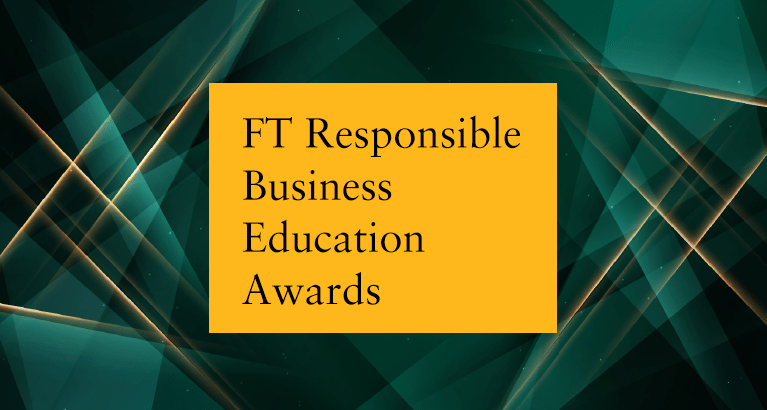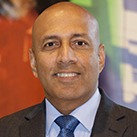Cambridge Judge Business School won top honours in the Teaching and Academic Research categories of the 2024 Financial Times Responsible Business Awards announced today (15 January), while the Business School was also Highly Commended for its Business School-wide activities that demonstrate responsible approaches to business education.
Redefining finance: winning course challenges traditional thinking and focuses on sustainability
The award-winning Purpose of Finance course looks beyond numbers to examine whether finance is fulfilling its societal purpose. The course was developed and taught to Master of Finance (MFin) and MBA students at Cambridge Judge Business School by Cambridge Judge Fellow (Finance) David Pitt-Watson and by Dr Ellen Quigley, Principal Research Associate, Co-Director of Finance for Systemic Change, and Special Adviser to the Chief Financial Officer at the University of Cambridge.
The course “seeks to challenge traditional ways of looking at finance and make the link between sustainability and the world at large,” said the Financial Times in announcing the awards.
“The course departs from the conventional neoclassical approach to finance, which often treats environmental and social sustainability issues as add-ons. Instead, the Cambridge programme starts by exploring the purpose of the finance industry and scrutinises how well it fulfils this purpose - especially in the context of sustainability challenges such as climate change.
“The course addresses real-world issues, such as biodiversity loss, to encourage students to think critically about the impact of financial decisions on the environment. An example of their practical approach is a simulation exercise that exposes students to the risks of asymmetric information. They assume roles of fund managers and clients, discovering first-hand how information disparities can affect financial decisions and market efficiency.”
Cambridge academics feature at Davos this week
The Purpose of Finance course had previously won the Page Prize, which recognises courses that “substantially upgrade sustainability courses or associated coursework into national and international business school curricula”.
David Pitt-Watson, formerly Pembroke Visiting Professor at Cambridge Judge, has widely advised companies and governments on sustainability issues, and is Chair of the Scottish Taskforce for Green and Sustainable Financial Services, while Dr Ellen Quigley’s work, alongside several top-50 asset owners, concerns the significant range in efficacy of the various tools available to investors to reduce companies’ externalities in the real world.
David and Ellen will both be on panels at this week’s World Economic Forum meeting in Davos, Switzerland – David on Monday 15 January as part of a panel discussion to launch a new Financial Times magazine “The growing case for responsible business education”, and Ellen at a related seminar on Wednesday 15 January that focuses on how business schools are responding to global issues including climate crisis, geopolitical conflict and mineral scarcity.
Research by Professor Mark de Rond on paedophile hunting wins Academic Research award

Research by Mark de Rond, Professor of Organisational Ethnography at Cambridge Judge, on the controversial practice of ‘paedophile hunting’ won top honours in the FT Academic Research category for best business school impactful academic research addressing societal challenges. Mark’s research often involves long-term embedding with groups studied, which have included medics during the war in Afghanistan and champion rowers.
Mark’s study on paedophile hunters – entitled “To catch a predator: the lived experience of extreme practices” – was published in the Academy of ManagementJournal.
“Mark de Rond of Cambridge Judge Business School has attempted to apply a research-led approach” to difficult issues surrounding paedophile hunters, the Financial Times said in announcing his award, “by studying the activities of a ‘hunter’ team over a period of 3 years”.
“His work has had a beneficial impact,” the FT said, “by allowing police to explain to hunters how their work impacts policing priorities. Police and hunters even discussed ways in which they might work together more closely within the limits of the law — which, if put into action, would see these suspects going through the appropriate and regulated police processes.
“Dan Vajzovic, deputy chief constable of Bedfordshire Police, wrote to de Rond to say: ‘Without you, I would have found it much more difficult to achieve a policy position which was effective and sustainable. I remain grateful for your ongoing labours in this area including the recent listening circle event which I hope will bring greater awareness of police concerns directly to the Online Child Abuse Activist Groups community more widely.’”
Cambridge Judge is Highly Commended for Business School-wide activities
In addition, Cambridge Judge was Highly Commended for its Business School-wide activities and initiatives. This category recognises “best business school demonstrating system-wide responsible business principles integrated throughout teaching, research, operations and student outcomes”. The Cambridge Judge entry outlined the Business School’s many activities – in programmes, research centres, operations and beyond – that responsibly contribute to a better society.
Dean says that the recognition highlights importance of responsible business throughout Cambridge Judge
Cambridge Judge Business School is very proud to be recognised by these prestigious awards, which reflect how seriously the School approaches the subject of responsible business including in our teaching and research.
“The Purpose of Finance course offered to our MFin and MBA students looks beyond balance sheets to focus on the pivotal role that finance can play in solving some of the world’s most critical problems; it looks at what the finance industry can and should do, and how shortcomings can be improved. Many congratulations to David Pitt-Watson and Ellen Quigley for developing and teaching this important course,” said Professor Dissanaike.
“The unique work of Professor Mark de Rond in studying paedophile ‘hunting’ gangs has been widely recognised by both academics and practitioners as bringing a better understanding of a difficult issue. Following his research, Mark has worked with police officials to improve data collection and has helped bring police and hunters together to find better approaches. It is gratifying that the important impact of Mark’s work is honoured by these FT awards. “Being Highly Commended by the FT for our Business School-wide activities shows that responsibility is an integral part of everything we do – including teaching, research, operations, student projects and learning outcomes.”
Featured research
de Rond, M., Lok, J. and Marrison, A. (2022) “To catch a predator: the lived experience of extreme practices.” Academy of Management Journal
Featured course
The award-winning Purpose of Finance course looks beyond numbers to examine whether finance is fulfilling its societal purpose. It previously won the Page Prize.






